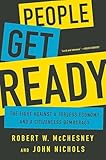People get ready : the fight against a jobless economy and a citizenless democracy / Robert W. McChesney and John Nichols.
Material type: TextLanguage: English Publisher: New York : Nation Books, 2016Description: v, 360 pages : illustrations ; 25 cmContent type:
TextLanguage: English Publisher: New York : Nation Books, 2016Description: v, 360 pages : illustrations ; 25 cmContent type: - text
- unmediated
- volume
- 9781568585215 (hardcover)
- 1568585217 (hardcover)
- Democracy -- United States
- Democracia -- Estados Unidos
- Labor -- United States
- Trabajo -- Estados Unidos
- Technological innovations -- Economic aspects -- United States
- Innovaciones tecnológicas -- Aspectos económicos -- Estados Unidos
- United States -- Economic conditions -- 2009-
- Estados Unidos -- Condiciones económicas -- 2009-
- United States -- Social conditions
- Estados Unidos -- Condiciones sociales
- United States -- Politics and government -- 2009-2017
- Estados Unidos -- Política y gobierno -- 2009-2017
- 320.973
- HC 106.84 M478p 2016
| Item type | Current library | Home library | Collection | Shelving location | Call number | Copy number | Status | Date due | Barcode |
|---|---|---|---|---|---|---|---|---|---|
 Libro
Libro
|
Biblioteca Juan Bosch | Biblioteca Juan Bosch | Ciencias Sociales | Ciencias Sociales (3er. Piso) | HC 106.84 M478p 2016 (Browse shelf(Opens below)) | 1 | Available | 00000128295 |
Browsing Biblioteca Juan Bosch shelves, Shelving location: Ciencias Sociales (3er. Piso), Collection: Ciencias Sociales Close shelf browser (Hides shelf browser)
Includes bibliographical references (pages 291-342) and index.
Introduction: welcome to the future
Into the maelstrom
A jobless economy?
Citizenless democracy
Democratic infrastructure
Overcoming the democratic disconnect
A democratic agenda for a digital age
Statistical appendix / R. Jamil Jonna.
The consequences of the technological revolution are about to hit hard: unemployment will spike as new technologies replace labor in the manufacturing, service, and professional sectors of an economy that is already struggling. The end of work as we know it will hit at the worst moment imaginable: as capitalism fosters permanent stagnation, when the labor market is in decrepit shape, with declining wages, expanding poverty, and scorching inequality. Only the dramatic democratization of our economy can address the existential challenges we now face. Yet, the US political process is so dominated by billionaires and corporate special interests, by corruption and monopoly, that it stymies not just democracy but progress. The great challenge of these times is to ensure that the tremendous benefits of technological progress are employed to serve the whole of humanity, rather than to enrich the wealthy few. Robert W. McChesney and John Nichols argue that the United States needs a new economy in which revolutionary technologies are applied to effectively address environmental and social problems and used to rejuvenate and extend democratic institutions. Based on intense reporting, rich historical analysis, and deep understanding of the technological and social changes that are unfolding, they propose a bold strategy for democratizing our digital destiny--before it's too late--and unleashing the real power of the Internet, and of humanity.









There are no comments on this title.